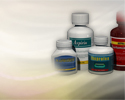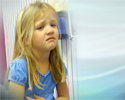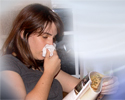Cold medicines and children
OTC children; Acetaminophen - children; Cold and cough - children; Decongestants - children; Expectorants - children; Antitussive - children; Cough suppressant - children
Over-the-counter cold medicines are drugs you can buy without a prescription. OTC cold medicines may help relieve symptoms of a cold.
This article is about OTC cold medicines for children. These cold remedies should be used with caution. They are not recommended for children younger than age 4.
About OTC Cold Medicines
Cold medicines do not cure or shorten a cold. Most colds go away in 1 to 2 weeks. Often, children get better without needing these medicines.
OTC cold medicines can help treat cold symptoms and make your child feel better. They may:
- Shrink the swollen lining of the nose, throat, and sinuses.
- Relieve sneezing and an itchy, runny nose.
- Clear mucus from the airways (cough remedies).
- Suppress coughs.
Most cold medicines also include acetaminophen (Tylenol) or ibuprofen (Advil, Motrin) to help relieve headaches, fever, and aches and pains.
Younger children are usually given liquid medicines using teaspoons. For infants, the same medicine may be available in a more concentrated form (drops).
Use OTC Cold Medicines With Care
OTC cold medicines may cause serious side-effects, including:
- Seizures
- Rapid heart beat
- Reduced consciousness
- Reye syndrome (from aspirin)
- Death
Certain medicines should not be given to children, or only after a certain age.
- Do not give cold medicines to children less than 4 years old.
- Only give cold medicines to children ages 4 to 6 years if your doctor recommends it.
- Do not give ibuprofen to children younger than 6 months unless directed by a doctor.
- Do not give aspirin if your child is younger than 12 to 14 years.
Taking too many different medicines also may cause harm. Most OTC cold remedies contain more than one active ingredient.
- Avoid giving more than one OTC cold medicine to your child. It may cause an overdose with severe side effects.
- Replacing one cold medicine with another may be ineffective or cause an overdose.
Follow the dosage instructions strictly while giving an OTC medicine to your child.
When giving OTC cold medicines to your child:
- Ask yourself if your child really needs it - a cold will go away on its own without treatment.
- Read the label. Check the active ingredients and strength.
- Stick to the right dose -- less could be ineffective, more could be unsafe.
- Follow instructions. Be sure you know how to give the medicine and how often to give it in a day.
- Use the syringe or measuring cup provided with the liquid medicines. Do not use a household spoon.
- If you have any questions or concerns, talk to your pharmacist or health care provider.
- Never give OTC medicines to children less than 2 years old unless your health care provider recommends it.
You can also try some home care tips to help relieve cold symptoms in infants and younger children.
Store medicines in a cool, dry area. Keep all medicines out of the reach of children.
When to Call the Doctor
Contact the provider if your child has:
- Fever
- Earache
- Yellow green or gray mucus
- Pain or swelling in the face
- Breathing problems or chest pain
- Symptoms that lasts longer than 10 days or that get worse over time
Talk to your provider to learn more about colds and how you can help your child.
References
American Academy of Pediatrics, healthychildren.org website. Coughs and colds: medicines or home remedies? www.healthychildren.org/English/health-issues/conditions/chest-lungs/Pages/Coughs-and-Colds-Medicines-or-Home-Remedies.aspx. Updated December 2, 2022. Accessed December 14, 2022.
Lopez SMC, Williams JV. The common cold. In: Kliegman RM, St. Geme JW, Blum NJ, Shah SS, Tasker RC, Wilson KM, eds. Nelson Textbook of Pediatrics. 21st ed. Philadelphia, PA: Elsevier; 2020:chap 407.
US Food and Drug Administration website. Use caution when giving cough and cold products to kids. www.fda.gov/drugs/special-features/use-caution-when-giving-cough-and-cold-products-kids. Updated February 8, 2018. Accessed December 14, 2022.
Review Date: 10/22/2022
Reviewed By: Charles I. Schwartz, MD, FAAP, Clinical Assistant Professor of Pediatrics, Perelman School of Medicine at the University of Pennsylvania, General Pediatrician at PennCare for Kids, Phoenixville, PA. Also reviewed by David C. Dugdale, MD, Medical Director, Brenda Conaway, Editorial Director, and the A.D.A.M. Editorial team.




